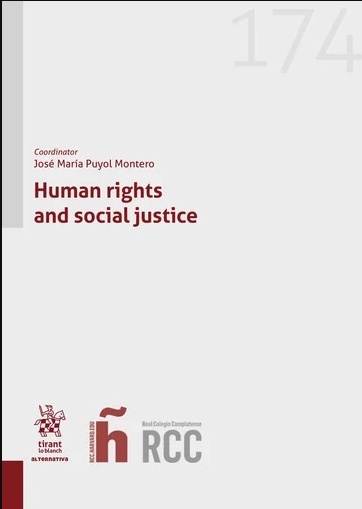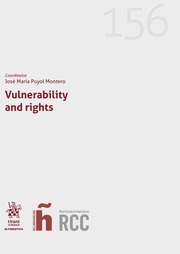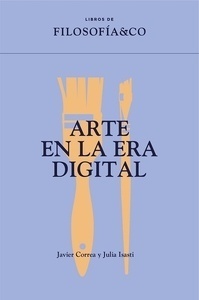Human dignity, vulnerability and Law. Studies on the dignity of human life
Puyol Montero, José MaríaEditorial Tirant lo Blanch
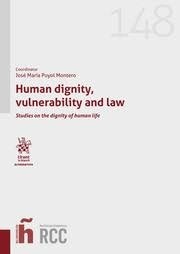

Formato papel
[Disponible. 3-7 días]
antes:
39,00 €
ahora:
37,05 €
Human dignity, vulnerability and Law. Studies on the dignity of human life
Puyol Montero, José María
Editorial Tirant lo Blanch
On September 24th 2020 a seminar
was organized by RCC Study Group Studies on Life and Human Dignity at Harvard Law School (Cambridge, Massachusetts). The seminar New Challenges for Law: Human Dignity, Vulnerability and Social Justice in the Time of the Pandemic was to gather well-renowned professors from different fields of science from prestigious European and American universities. But the Covid-19 pandemic forced the organizers to suspend the seminar at the last moment. The aim of the encounter was to analyze and study the concept of human dignity in life and at the end of life, and some of its manifestations and potential threats in today?s world.
In the last decades, a spectacular development in the diverse fields of science, economy, trade and communications has taken place in society. These advances in human progress, as laudable as they may be, often do not effectively correspond to parallel recognition of every man and woman?s human dignity. In fact, in many cases, this progress results in a series of contradictions and possible dangers and challenges.
This book brings together a selection of papers that were to be presented at that seminar, regarding the big issue of human dignity and law.
Table of contents
Prologue 17
Introduction: The Value of Human Dignity 21
IN THE NAME OF DIGNITY OR THE DIGNITY OF A NAME: THE JEWS
María-Jesús Torquemada
I. INTRODUCTION: NAME, IDENTITY AND DIGNITY 25
II. BRIEF NOTES ON THE NAME AS A FUNDAMENTAL RIGHT OF THE PERSON AT THE INTERNATIONAL LEVEL AND ITS CONSTITUTIONAL CONCRETION IN SPAIN 28
III. THE RENUNCIATION OR DEPRIVATION OF THE NAME FOR REASONS OF RELIGIOUS PERSECUTION. THE PARTICULAR CASE OF THE JEWS IN A RETROSPECTIVE APPROACH 31
II.1. Germany 31
III.1.1. Germany between the wars and during the Nazi period. The emigration 31
III.1.2. Precedents: Germanic legislation prior to the Nazi period and its aftermath 34
II.2. The Spanish case: The erga omnes renunciation of the Jewish name to avoid inquisitorial persecution: some particular cases and consequences 36
On Human Dignity?
Javier Aranguren
I. ROUSSEAU ON SENTIENT BEINGS' 43
II. OF PETS AND MEN 45
III. ECOLOGICAL, ANIMALISTIC AND CLASSICAL APPROACH 49
Ancient Origins of Dignity at Work: Freedmen's Social Protections and Digital Platform Workers*
Grzegorz Blicharz
I. INTRODUCTION 56
II. TWO COMPARATIVE MODELS: SETTING THE STAGE 61
III. DIGNITY AS AN EQUAL RATHER THAN THE FOREMOST CONCERN FUNCTIONAL SIMILARITY 64
IV. DIGNITY, DIGNITAS AND EXISTIMATIO CONTENT SIMILARITY BETWEEN THE EU PROPOSAL, CATHOLIC SOCIAL TEACHING AND ROMAN LAW 66
V. DIGNITY AND DIGNITAS RESPECT TOWARDS THE WORKER'S PRIVATE SPHERE 70
VI. PLURALITY OF GOODS COMPRISED IN THE CONCEPT OF HUMAN DIGNITY 71
VII. THE UNDERLYING JUSTIFICATION FOR PROTECTION OF FREEDMEN 74
VIII. CONCLUSION 77
LAZINESS AS AN ANTHROPOLOGICAL CHALLENGE FOR LAW IN THE TIME OF THE PANDEMIC
Franciszek Longchamps de Bérier
I. PANDEMIC EXPERIENCE AND LEGAL INTUITION 80
II. TERMINOLOGICAL DIVERSITY IN FACE OF THE NEED TO ACCURATELY DESCRIBE A SOCIAL SITUATION 84
III. LAZINESS WITHOUT LEGAL CONSEQUENCES? 88
IV. LAZINESS IN THE FACE OF DUTY 92
V. LAZINESS AS LEGALLY-GRADABLE 99
VI. SEARCHING FOR A LEGAL DEFINITION OF LAZINESS 106
Moral absolutes in business practice? A human rights-based argument
Hugo S. Ramírez-García
I. FOREWORD 109
II. THE VULNERABLE NATURE OF THE HUMAN 111
III. ECONOMIC GLOBALIZATION: AN AMBIVALENT SCENARIO FOR HUMAN RIGHTS 112
IV. HUMAN RIGHTS AND MORAL ABSOLUTES 115
V. EXTRA COMMERCIUM RATIONALE AS A FRAMEWORK FOR BUSINESS PRACTICES 118
VI. FINAL REMARKS 120
THE RIGHT OF ACCESS TO PUBLIC INFORMATION AND ITS LINK WITH FUNDAMENTAL RIGHTS
Manuel Estepa Montero
I. THE GENESIS OF THE CURRENT FORMULATION OF THE RIGHT TO PUBLIC INFORMATION 123
II. CONSIDERATIONS ON THE LEGAL NATURE OF THE RIGHT TO PUBLIC INFORMATION 126
III. THE INSTITUTION OF THE OMBUDSMAN IS STRONGLY IN FAVOUR OF THE FUNDAMENTAL NATURE OF THE RIGHT TO PUBLIC INFORMATION 131
IV. THE LEGAL NATURE OF THE RIGHT OF ACCESS TO PUBLIC INFORMATION. ITS INSTRUMENTAL CHARACTER FOR THE EXERCISE OF FUNDAMENTAL RIGHTS 133
V. CONCLUSIONS 138
THE DIGNITY OF THE HUMAN PERSON AND RESPECT FOR THE RIGHT TO PERSONAL DATA PROTECTION
Javier Puyol Montero
I. INTRODUCTION 141
II. THE PRINCIPLES THAT INSPIRE THE RIGHT TO HUMAN DIGNITY 149
III. THE PROTECTION OF PERSONAL DATA AND THE DIGNITY OF THE HUMAN PERSON 151
IV. THE PRINCIPLES THAT INFORM THE RIGHT TO PROTECTION OF PERSONAL DATA 153
HOW NEW WORLD order' SCENARIOS FACE FREEDOM OF CONSCIENCE AND HUMAN DIGNITY IN TIME OF PANDEMIC AND EMERGENCY LAWS
Liviu Olteanu
First Part. FREEDOM OF CONSCIENCE VERSUS NEW NORMALCY 160
I. INTRODUCTION 160
II. A NEW FUTURE DURING EMERGENCY TIMES 161
II.1. Introductory Reflections 161
II.2. Big Scenarious on a New Future 163
II.2.1. A Cosmic Panorama of the Future: King Nebuchadnezzar of Babylon's Dream 165
II.2.2. The American Intentions on New World Order 167
II.2.3. China's Artificial Intelligence as A New World Order 168
II.2.4. Concern of Democracy in Digital Age 169
II.3. Scenarios' Etiology on Creating Narratives: Plandemic or Dreams? 170
II.3.1. Beliefs Desirable for Authorities 171
II.3.2. New Enemies Must Be Identified 172
II.3.3. Reasonable Doubt' Ahead of Political Correctness' 172
II.3.4. The Sense of Threat and Restriction of Liberty 173
II.3.5. Lock Step' Scenario: Control and Authoritarian Leadership 174
II.3.6. The Greatest Risk of Global Catastrophe 175
II.3.7. The SPARS Pandemic 2025 -2028: A Futuristic Scenario 176
II.3.8. No Doubt We'll Get Surprised 176
II.3.9. Event 201 Exercise: A Severe Pandemic 177
II.3.10. Emergency Measures as A Fixture of Life 177
II.3.11. From Crossroads to Future Starts Today 178
II.3.12. Scientific' and Political Prophecies on Horizon 179
II.3.13. The Great Reset and New World Order 180
II.3.14. Global Information Control and Communication 181
II.3.15. Re-Create A New World Order for Autocracy 182
II.3.16. Climate Change, Conscience and Sunday Law 183
II.4. Transition to Uncertainty 185
III. FREEDOM OF CONSCIENCE AND HUMAN DIGNITY UNDER ATTACK 185
III.1. Introductory Reflections 185
III.2. Roger Williams: An Uncharted Ground For A New World 186
III.3. International Law on Dignity, Conscience and Free-Will 187
III.3.1. Universal Declaration of Human Rights 187
III.3.2. International Covenant on Civil and Political Rights (ICCPR) 187
III.3.3. Office of High Commissioner for Human Rights (OHCHR) Module 1, Commitment 1 188
III.3.4. Declaration on the Elimination of All Forms of Intolerance and of Discrimination 188
III.3.5. UNESCO - Universal Declaration on Bioethics and Human Rights (October 19, 2005) 189
III.3.6. Council of Europe European Convention on Human Rights 189
III.3.7. Council of Europe - Convention for the Protection of Human Rights and Dignity of the Human Being with regard to the Application of Biology and Medicine 190
III.3.8. United States of America - First Amendment 191
III.3.9. The Spanish Constitution and Law 24/1992 191
III.4. Council of Europe: Political Remarks on Conscience 192
III.5. A Historical Development: Catholic Thought, Reformation and Secularism 192
III.5.1. Catholic Thought, Conscience And Common Good 192
III.5.2. Conscience and Reformation 194
III.5.3. Conscience and Secularism 196
III.6. Separation of Church and State Prevents Abuses and Persecution 197
III.7. Conscience: Between Uncertainty and Fragmentation 199
III.8. Liberty and Health Alliance: Avoiding Confusions 200
IV. TODAY'S VULNERABILITIES: GOVERNMENT RESTRICTIONS, SOCIAL HOSTILITIES and RELIGION'S ABUSES AND PERSECUTION 204
IV.1. Government Restrictions on Conscience and Religious Liberty 204
IV.2. Social Hostilities and Rising Violence by Non-State Actors 206
IV.3. A Case-Study: The Tomorrow War' Movie 207
IV.4. Religion Abuse and Persecution Caused by Own's Religion 209
IV.5. Pyramid of Religious Abuse Carried Out by One's Religión 212
V. CONCLUSION 214
V.1. Dignity a Solution Against Any Common Enemy 214
V.2. Law's Limitations of Emergency Measures' 215
V.3. Facing the Future 216
THE PRINCIPLE OF HUMAN VULNERABILITY: HOW IS IT GROUNDED?
Maria do Céu Patr o Neves
I. GENEALOGY OF THE CONCEPT OF VULNERABIILITY 218
I.2. The conceptualization process 219
II. VULNERABILITY AS AN ETHICAL PRINCIPLE 223
II.1. What is an ethical principle? 223
II.2. The principle of vulnerability in the Declaration on Bioethics and Human Rights 224
III. THE FOUNDATIONS OF THE PRINCIPLE OF VULNERABILITY 226
III.1. Criticism: a question of guidance 226
III.2. Grounding vulnerability 229
VULNERABILITY, INTERDEPENDENCE AND COMPASSION: A CHALLENGE FOR THE LAW
Vicente Bellver Capella
I. INTRODUCTION 233
II. THE HUMAN CONDITION: VULNERABILITY, INTERDEPENDENCE, COMPASSION 235
II.1. The human being is an essentially fragile being 235
II.2. The human being is necessarily interdependent 239
II.3. The human being must be compassionate 240
III. THE PRINCIPLE OF VULNERABILITY IN INTERNATIONAL HUMAN RIGHTS LAW 245
IV. CONCLUSION: FROM VULNERABILITY AS A FACT TO VULNERABILITY AS A LEGAL PRINCIPLE 251
THE ETHICS OF CARE IN A POST-PANDEMIC WORLD
Francesc Torralba
I. CRISIS AS OPPORTUNITY 253
II. THE POST-PANDEMIC WORLD 254
II.1. The uncertainty of the future 254
II.2. The volatility of the world 256
II.3. Global interdependence 257
II.4. The hyper-accelerated processes 259
II.5. The vulnerability of the human condition 260
II.6. Complexity versus neo-populism 262
III. THE ETHICS OF CARE 264
THE PERMANENCE OF THE DUTY OF CARE UNDER THE REFORM OF THE CIVIL CODE FOR THE ADAPTATION OF THE UN CONVENTION ON THE RIGHTS OF PERSONS WITH DISABILITIES IN SPAIN: A CRITIQUE OF THE CENTRALITY OF THE PRINCIPLE OF AUTONOMY IN THE SITUATIONS OF OLDER PEOPLE WITHOUT SOCIAL SUPPORT
Joaquín María Rivera Álvarez
I. THE AIM OF THESE LINES: THE CRITICISM OF A LEGISLATIVE WORK THAT DENATURALISES THE INSTITUTIONS OF CIVIL PROTECTION OF PERSONS WITH DISABILITIES FOR FOCUSIN THE REFORM ON THE PRINCIPLE OF AUTONOMY 268
II. THE MEANING AND USE OF THE CONCEPT OF CAPACITY AND ITS DIFFERENT CATEGORIES 272
III. THE AVOIDANCE' OF THE DUTY OF CARE 278
IV. PATRIMONIAL ADMINISTRATION IN THE ENVIRONMENT OF SUPPORT INSTITUTIONS 283
V. SOME LIMITS OF THE EXERCISE OF THE DUTIES OF PERSONAL AND PATRIMONIAL CARE 285
VI. SOME CONCLUSIONS 288
VII. BIBLIOGRAPHY 289
THE DIGNITY OF HUMAN LIFE AT THE TIME OF DEATH: SOME ELEMENTS FOR REFLECTION ON EUTHANASIA AT THE BEGINNING OF THE 21ST CENTURY
José María Puyol Montero
I. INTRODUCTION: LIFE WITH DIGNITY AND DEATH WITH DIGNITY 291
II. WHAT IS MEANT BY EUTHANASIA? 297
III. IS EUTHANASIA THE SOLUTION? THE INCONSISTENCIES OF EUTHANASIA 303
IV. THE ABSENCE OF DEBATE ON EUTHANASIA 307
V. SOME CONSEQUENCES OF LEGALIZING EUTHANASIA 309
VI. SOME MESSAGES EUTHANASIA SENDS 314
VII. EUTHANASIA, FREE WILL AND FREEDOM 315
VIII. SOME FINAL CONSIDERATIONS ON THE 2021 SPANISH EUTHANASIA LAW 321
ANNEX ACTIVITIES ORGANIZED OR SPONSORED BY RCC Study Group Studies on Life and Human Dignity 325
was organized by RCC Study Group Studies on Life and Human Dignity at Harvard Law School (Cambridge, Massachusetts). The seminar New Challenges for Law: Human Dignity, Vulnerability and Social Justice in the Time of the Pandemic was to gather well-renowned professors from different fields of science from prestigious European and American universities. But the Covid-19 pandemic forced the organizers to suspend the seminar at the last moment. The aim of the encounter was to analyze and study the concept of human dignity in life and at the end of life, and some of its manifestations and potential threats in today?s world.
In the last decades, a spectacular development in the diverse fields of science, economy, trade and communications has taken place in society. These advances in human progress, as laudable as they may be, often do not effectively correspond to parallel recognition of every man and woman?s human dignity. In fact, in many cases, this progress results in a series of contradictions and possible dangers and challenges.
This book brings together a selection of papers that were to be presented at that seminar, regarding the big issue of human dignity and law.
Table of contents
Prologue 17
Introduction: The Value of Human Dignity 21
IN THE NAME OF DIGNITY OR THE DIGNITY OF A NAME: THE JEWS
María-Jesús Torquemada
I. INTRODUCTION: NAME, IDENTITY AND DIGNITY 25
II. BRIEF NOTES ON THE NAME AS A FUNDAMENTAL RIGHT OF THE PERSON AT THE INTERNATIONAL LEVEL AND ITS CONSTITUTIONAL CONCRETION IN SPAIN 28
III. THE RENUNCIATION OR DEPRIVATION OF THE NAME FOR REASONS OF RELIGIOUS PERSECUTION. THE PARTICULAR CASE OF THE JEWS IN A RETROSPECTIVE APPROACH 31
II.1. Germany 31
III.1.1. Germany between the wars and during the Nazi period. The emigration 31
III.1.2. Precedents: Germanic legislation prior to the Nazi period and its aftermath 34
II.2. The Spanish case: The erga omnes renunciation of the Jewish name to avoid inquisitorial persecution: some particular cases and consequences 36
On Human Dignity?
Javier Aranguren
I. ROUSSEAU ON SENTIENT BEINGS' 43
II. OF PETS AND MEN 45
III. ECOLOGICAL, ANIMALISTIC AND CLASSICAL APPROACH 49
Ancient Origins of Dignity at Work: Freedmen's Social Protections and Digital Platform Workers*
Grzegorz Blicharz
I. INTRODUCTION 56
II. TWO COMPARATIVE MODELS: SETTING THE STAGE 61
III. DIGNITY AS AN EQUAL RATHER THAN THE FOREMOST CONCERN FUNCTIONAL SIMILARITY 64
IV. DIGNITY, DIGNITAS AND EXISTIMATIO CONTENT SIMILARITY BETWEEN THE EU PROPOSAL, CATHOLIC SOCIAL TEACHING AND ROMAN LAW 66
V. DIGNITY AND DIGNITAS RESPECT TOWARDS THE WORKER'S PRIVATE SPHERE 70
VI. PLURALITY OF GOODS COMPRISED IN THE CONCEPT OF HUMAN DIGNITY 71
VII. THE UNDERLYING JUSTIFICATION FOR PROTECTION OF FREEDMEN 74
VIII. CONCLUSION 77
LAZINESS AS AN ANTHROPOLOGICAL CHALLENGE FOR LAW IN THE TIME OF THE PANDEMIC
Franciszek Longchamps de Bérier
I. PANDEMIC EXPERIENCE AND LEGAL INTUITION 80
II. TERMINOLOGICAL DIVERSITY IN FACE OF THE NEED TO ACCURATELY DESCRIBE A SOCIAL SITUATION 84
III. LAZINESS WITHOUT LEGAL CONSEQUENCES? 88
IV. LAZINESS IN THE FACE OF DUTY 92
V. LAZINESS AS LEGALLY-GRADABLE 99
VI. SEARCHING FOR A LEGAL DEFINITION OF LAZINESS 106
Moral absolutes in business practice? A human rights-based argument
Hugo S. Ramírez-García
I. FOREWORD 109
II. THE VULNERABLE NATURE OF THE HUMAN 111
III. ECONOMIC GLOBALIZATION: AN AMBIVALENT SCENARIO FOR HUMAN RIGHTS 112
IV. HUMAN RIGHTS AND MORAL ABSOLUTES 115
V. EXTRA COMMERCIUM RATIONALE AS A FRAMEWORK FOR BUSINESS PRACTICES 118
VI. FINAL REMARKS 120
THE RIGHT OF ACCESS TO PUBLIC INFORMATION AND ITS LINK WITH FUNDAMENTAL RIGHTS
Manuel Estepa Montero
I. THE GENESIS OF THE CURRENT FORMULATION OF THE RIGHT TO PUBLIC INFORMATION 123
II. CONSIDERATIONS ON THE LEGAL NATURE OF THE RIGHT TO PUBLIC INFORMATION 126
III. THE INSTITUTION OF THE OMBUDSMAN IS STRONGLY IN FAVOUR OF THE FUNDAMENTAL NATURE OF THE RIGHT TO PUBLIC INFORMATION 131
IV. THE LEGAL NATURE OF THE RIGHT OF ACCESS TO PUBLIC INFORMATION. ITS INSTRUMENTAL CHARACTER FOR THE EXERCISE OF FUNDAMENTAL RIGHTS 133
V. CONCLUSIONS 138
THE DIGNITY OF THE HUMAN PERSON AND RESPECT FOR THE RIGHT TO PERSONAL DATA PROTECTION
Javier Puyol Montero
I. INTRODUCTION 141
II. THE PRINCIPLES THAT INSPIRE THE RIGHT TO HUMAN DIGNITY 149
III. THE PROTECTION OF PERSONAL DATA AND THE DIGNITY OF THE HUMAN PERSON 151
IV. THE PRINCIPLES THAT INFORM THE RIGHT TO PROTECTION OF PERSONAL DATA 153
HOW NEW WORLD order' SCENARIOS FACE FREEDOM OF CONSCIENCE AND HUMAN DIGNITY IN TIME OF PANDEMIC AND EMERGENCY LAWS
Liviu Olteanu
First Part. FREEDOM OF CONSCIENCE VERSUS NEW NORMALCY 160
I. INTRODUCTION 160
II. A NEW FUTURE DURING EMERGENCY TIMES 161
II.1. Introductory Reflections 161
II.2. Big Scenarious on a New Future 163
II.2.1. A Cosmic Panorama of the Future: King Nebuchadnezzar of Babylon's Dream 165
II.2.2. The American Intentions on New World Order 167
II.2.3. China's Artificial Intelligence as A New World Order 168
II.2.4. Concern of Democracy in Digital Age 169
II.3. Scenarios' Etiology on Creating Narratives: Plandemic or Dreams? 170
II.3.1. Beliefs Desirable for Authorities 171
II.3.2. New Enemies Must Be Identified 172
II.3.3. Reasonable Doubt' Ahead of Political Correctness' 172
II.3.4. The Sense of Threat and Restriction of Liberty 173
II.3.5. Lock Step' Scenario: Control and Authoritarian Leadership 174
II.3.6. The Greatest Risk of Global Catastrophe 175
II.3.7. The SPARS Pandemic 2025 -2028: A Futuristic Scenario 176
II.3.8. No Doubt We'll Get Surprised 176
II.3.9. Event 201 Exercise: A Severe Pandemic 177
II.3.10. Emergency Measures as A Fixture of Life 177
II.3.11. From Crossroads to Future Starts Today 178
II.3.12. Scientific' and Political Prophecies on Horizon 179
II.3.13. The Great Reset and New World Order 180
II.3.14. Global Information Control and Communication 181
II.3.15. Re-Create A New World Order for Autocracy 182
II.3.16. Climate Change, Conscience and Sunday Law 183
II.4. Transition to Uncertainty 185
III. FREEDOM OF CONSCIENCE AND HUMAN DIGNITY UNDER ATTACK 185
III.1. Introductory Reflections 185
III.2. Roger Williams: An Uncharted Ground For A New World 186
III.3. International Law on Dignity, Conscience and Free-Will 187
III.3.1. Universal Declaration of Human Rights 187
III.3.2. International Covenant on Civil and Political Rights (ICCPR) 187
III.3.3. Office of High Commissioner for Human Rights (OHCHR) Module 1, Commitment 1 188
III.3.4. Declaration on the Elimination of All Forms of Intolerance and of Discrimination 188
III.3.5. UNESCO - Universal Declaration on Bioethics and Human Rights (October 19, 2005) 189
III.3.6. Council of Europe European Convention on Human Rights 189
III.3.7. Council of Europe - Convention for the Protection of Human Rights and Dignity of the Human Being with regard to the Application of Biology and Medicine 190
III.3.8. United States of America - First Amendment 191
III.3.9. The Spanish Constitution and Law 24/1992 191
III.4. Council of Europe: Political Remarks on Conscience 192
III.5. A Historical Development: Catholic Thought, Reformation and Secularism 192
III.5.1. Catholic Thought, Conscience And Common Good 192
III.5.2. Conscience and Reformation 194
III.5.3. Conscience and Secularism 196
III.6. Separation of Church and State Prevents Abuses and Persecution 197
III.7. Conscience: Between Uncertainty and Fragmentation 199
III.8. Liberty and Health Alliance: Avoiding Confusions 200
IV. TODAY'S VULNERABILITIES: GOVERNMENT RESTRICTIONS, SOCIAL HOSTILITIES and RELIGION'S ABUSES AND PERSECUTION 204
IV.1. Government Restrictions on Conscience and Religious Liberty 204
IV.2. Social Hostilities and Rising Violence by Non-State Actors 206
IV.3. A Case-Study: The Tomorrow War' Movie 207
IV.4. Religion Abuse and Persecution Caused by Own's Religion 209
IV.5. Pyramid of Religious Abuse Carried Out by One's Religión 212
V. CONCLUSION 214
V.1. Dignity a Solution Against Any Common Enemy 214
V.2. Law's Limitations of Emergency Measures' 215
V.3. Facing the Future 216
THE PRINCIPLE OF HUMAN VULNERABILITY: HOW IS IT GROUNDED?
Maria do Céu Patr o Neves
I. GENEALOGY OF THE CONCEPT OF VULNERABIILITY 218
I.2. The conceptualization process 219
II. VULNERABILITY AS AN ETHICAL PRINCIPLE 223
II.1. What is an ethical principle? 223
II.2. The principle of vulnerability in the Declaration on Bioethics and Human Rights 224
III. THE FOUNDATIONS OF THE PRINCIPLE OF VULNERABILITY 226
III.1. Criticism: a question of guidance 226
III.2. Grounding vulnerability 229
VULNERABILITY, INTERDEPENDENCE AND COMPASSION: A CHALLENGE FOR THE LAW
Vicente Bellver Capella
I. INTRODUCTION 233
II. THE HUMAN CONDITION: VULNERABILITY, INTERDEPENDENCE, COMPASSION 235
II.1. The human being is an essentially fragile being 235
II.2. The human being is necessarily interdependent 239
II.3. The human being must be compassionate 240
III. THE PRINCIPLE OF VULNERABILITY IN INTERNATIONAL HUMAN RIGHTS LAW 245
IV. CONCLUSION: FROM VULNERABILITY AS A FACT TO VULNERABILITY AS A LEGAL PRINCIPLE 251
THE ETHICS OF CARE IN A POST-PANDEMIC WORLD
Francesc Torralba
I. CRISIS AS OPPORTUNITY 253
II. THE POST-PANDEMIC WORLD 254
II.1. The uncertainty of the future 254
II.2. The volatility of the world 256
II.3. Global interdependence 257
II.4. The hyper-accelerated processes 259
II.5. The vulnerability of the human condition 260
II.6. Complexity versus neo-populism 262
III. THE ETHICS OF CARE 264
THE PERMANENCE OF THE DUTY OF CARE UNDER THE REFORM OF THE CIVIL CODE FOR THE ADAPTATION OF THE UN CONVENTION ON THE RIGHTS OF PERSONS WITH DISABILITIES IN SPAIN: A CRITIQUE OF THE CENTRALITY OF THE PRINCIPLE OF AUTONOMY IN THE SITUATIONS OF OLDER PEOPLE WITHOUT SOCIAL SUPPORT
Joaquín María Rivera Álvarez
I. THE AIM OF THESE LINES: THE CRITICISM OF A LEGISLATIVE WORK THAT DENATURALISES THE INSTITUTIONS OF CIVIL PROTECTION OF PERSONS WITH DISABILITIES FOR FOCUSIN THE REFORM ON THE PRINCIPLE OF AUTONOMY 268
II. THE MEANING AND USE OF THE CONCEPT OF CAPACITY AND ITS DIFFERENT CATEGORIES 272
III. THE AVOIDANCE' OF THE DUTY OF CARE 278
IV. PATRIMONIAL ADMINISTRATION IN THE ENVIRONMENT OF SUPPORT INSTITUTIONS 283
V. SOME LIMITS OF THE EXERCISE OF THE DUTIES OF PERSONAL AND PATRIMONIAL CARE 285
VI. SOME CONCLUSIONS 288
VII. BIBLIOGRAPHY 289
THE DIGNITY OF HUMAN LIFE AT THE TIME OF DEATH: SOME ELEMENTS FOR REFLECTION ON EUTHANASIA AT THE BEGINNING OF THE 21ST CENTURY
José María Puyol Montero
I. INTRODUCTION: LIFE WITH DIGNITY AND DEATH WITH DIGNITY 291
II. WHAT IS MEANT BY EUTHANASIA? 297
III. IS EUTHANASIA THE SOLUTION? THE INCONSISTENCIES OF EUTHANASIA 303
IV. THE ABSENCE OF DEBATE ON EUTHANASIA 307
V. SOME CONSEQUENCES OF LEGALIZING EUTHANASIA 309
VI. SOME MESSAGES EUTHANASIA SENDS 314
VII. EUTHANASIA, FREE WILL AND FREEDOM 315
VIII. SOME FINAL CONSIDERATIONS ON THE 2021 SPANISH EUTHANASIA LAW 321
ANNEX ACTIVITIES ORGANIZED OR SPONSORED BY RCC Study Group Studies on Life and Human Dignity 325
Formato papel
[Disponible. 3-7 días]
antes:
39,00 €
ahora:
37,05 €
FICHA TÉCNICA
- ISBN: 978-84-11-30725-3
- Fecha de edición: 2023
- Nº edición: 1
- Idioma: Castellano
- Encuadernación:
- Nº páginas: 330
- Materias: DERECHO INTERNACIONAL / Derechos humanos /
Otros libros de Puyol Montero, José María
-
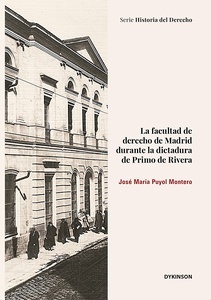
La facultad de derecho de madrid durante la dictadura de primo de rivera
Puyol Montero, José María
antes:
25,00 €ahora:
23,75 € -
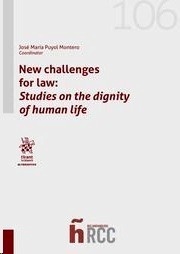
New challenges for law: Studies on the dignity of human life
Puyol Montero, José María
antes:
37,00 €ahora:
35,15 € -
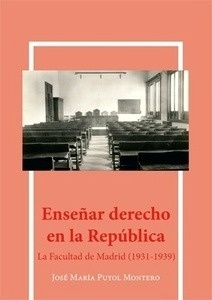
Enseñar derecho en la República "La facultad de Madrid (1931-1939)"
Puyol Montero, José María
antes:
45,00 €ahora:
42,75 €



